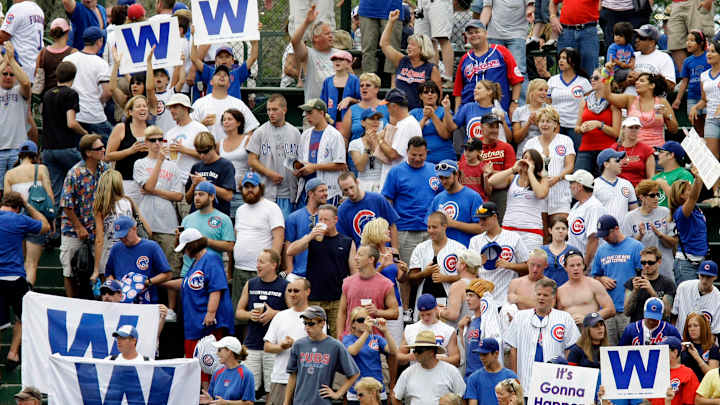If Cubs win it all, do Cubs fans lose something?

CHICAGO (AP) What happens when a lovable loser winds up a winner?
If the Chicago Cubs win the World Series for the first time since 1908, what happens to fans who have waited for next year their entire lives, the ones sporting T-shirts that read, ''Just win before I die''? What happens when someday arrives?
''It will be better than the tradition of losing that's been passed down,'' said Jim Beaupre, a 66-year-old retired teacher who grew up near Wrigley Field, his eyes welling with tears as he showed the venerable ballpark to his 4-year-old grand-nephew. ''It will be the curse is broken, the bad old days are gone.''
Others say victory will be a reward for sticking with a team that was so bad for so long.
''There's a sense that we paid our dues, we've watched utterly meaningless games in the dead of August ... we tilted our hats in the right way, worn our lucky shirts, stared at the TV at just the right angle, sat in our lucky chair and done all of that for decades and it's finally paying off,'' said Steve Rhodes, whose Chicago-oriented website, the Beachwood Reporter , once posted a song, ''Don't Start Believin','' to remind fans about the danger of hope.
At the same time, there is at least a little worry that winning a World Series means losing something developed for more than a century, bolstered by heartbreak, failure and, yes, resilience.
''We could totally change our identity in the next week or so,'' said Kiljoong Kim, 45, of Chicago. ''We all really want it, but there is no doubt that we are all going to miss what we used to be.''
Dr. Stephen Schueller, a clinical psychologist at Northwestern University who specializes in happiness and well-being, agrees.
''I do think there is some concern (that) if they win it, it is going to break this story we tell ourselves as Cubs fans,'' he said.
What that will look like is anyone's guess, though it could turn Cubs fans - the cuddly puppies of fandom - into something else.
''Fans could become unbearable,'' Rhodes lamented.
Al Yellon said one need only look eastward to see what could become of Cubs fans, how the friendly confines could become a decidedly different park.
''I look at the Red Sox fans, and when they suddenly won (in 2004 after 86 years), from the outside it looked like they became kind of insufferable,'' said Yellon, whose Cubs fan site is called bleedcubbieblue.com .
Rhodes and Yellon may be onto something. Scientifically speaking, there may be something different about the brain of a fan who has been subjected to repeated doses of optimism every spring training and the despair of the regular season and the certainty that next year will be THE year, according to one expert who has written extensively about brains in general and the brains of Cubs fans in particular.
Such fans ''turn out to be better decision-makers and deal better with divergent thought, as opposed to unreflective fans of winning teams,'' wrote Dr. Jordan Grafman, a professor of physical medicine and rehabilitation at Northwestern and a lifelong Cubs fan.
Grafman said Cubs fans shouldn't worry about losing those skills just yet, even if they outlast the Indians in a World Series that Cleveland led 2-1 heading into Saturday night's Game 4.
''One exposure (to winning) is not going to do the trick,'' he told The Associated Press.
On a recent bike ride over to Wrigley with his 2-year-old son, Matt Monsueto, 39, said he is happy at the prospect of his boy not having to endure the annual heartbreak that has for so long been part of the lives of Cubs fans.
And yet he wonders if success might change things for future generations of Cubs fans, make them less patient and more demanding.
''My two daughters are Blackhawks fans,'' Monsueto said of the hockey team that went nearly a half century without winning the Stanley Cup before winning three over the past seven years. ''They expect parades.''
If the brain of the Cubs is in no danger of changing anytime soon, much of what made the Cubs fandom so lovable to the rest of the country already has. The guys who dragged lawn chairs to the rooftops to watch the games have been replaced by corporate gatherings. The bleacher seats that were a few bucks are now far, far more.
''All that magical stuff is gone,'' Rhodes said. ''There's a new generation of fans who have invaded my piece of heaven.''
